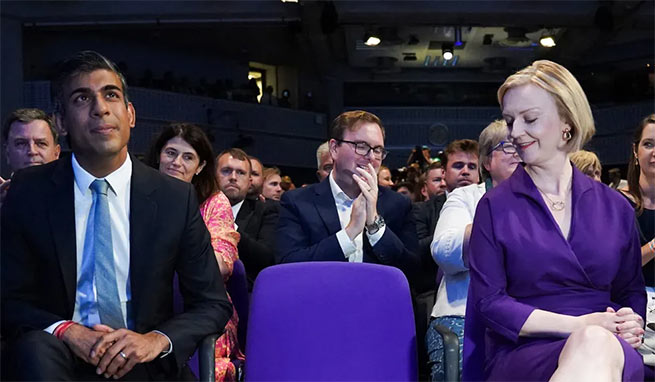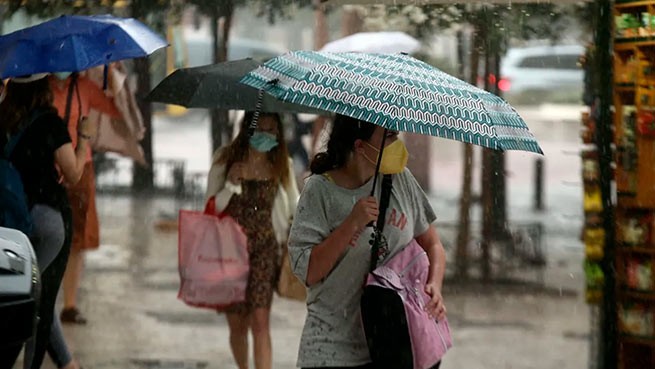British Prime Minister Liz Truss broke all political records, just 44 days after taking office, she announced her resignation.
The former prime minister has broken all records in Britain, as her tenure as prime minister is the shortest in the history of the country. After a meeting with the chairman of the 1922 Committee in charge of internal affairs, Sir Graham Brady Truss, announced to the public that she was leaving her post.
She tried to imitate Margaret Thatcher. The “Iron Lady” was in power for more than ten years, Truss was enough for 44 days …
According to British media, during the meeting, Sir Graham told Mrs Truss that she could no longer count on the support of a majority of Conservative MPs. A new head of government will be chosen within a week.
It took the new British Prime Minister Liz Truss, who took office on September 6, just six weeks to ruin her once brilliant political career. She made her way from a deputy in the council of the London Borough of Greenwich to Downing Street in just 16 years, during which time she sat in as many ministerial chairs as other British political centenarians did not occupy.
In record time, the new prime minister announced serious reforms of the financial system and immediately canceled them, brought down the ratings of the Conservative Party and the pound sterling, lost the trust of party members and fired her closest ally.
Unlike most prime ministers, Truss won the highest political office in the country not by the results of the general parliamentary elections, but by the results of an internal party vote. Only about 140 thousand party members took part in it – this is less than 1% of the total number of British voters. This vote was arranged because Prime Minister and Conservative leader Boris Johnson resigned in July 2022, unable to withstand public pressure after a series of political scandals. The Conservative Party, which retained the majority in parliament, had to urgently elect a new leader: he automatically took the vacant chair of the prime minister and remained in it until the end of the parliamentary term.
What went wrong in the fall?
Upon becoming prime minister on September 6, 2022, Liz Truss appointed longtime collaborator and associate Quasi Kwarteng as Chancellor of the Exchequer. On September 23, he announced large-scale reforms designed, as promised, to revive the British economy – we are talking about the Growth Plan 2022 approved by Truss, which aimed to increase economic growth to 2.5% per year.
The revival really happened, but not in the way the government wanted. The national economy was in a fever, as the plan combined social welfare measures and the largest tax cut in decades, but did not explain how future loans would affect the national debt.
Quarteng suggested:
- reduce the base income tax rate from 20% to 19%;
- reduce corporate tax;
- remove any restrictions on bank bonuses;
- abolish the increased income tax rate (45%) for those who earn more than 150 thousand pounds a year;
- double the Stamp Duty threshold;
- freeze household electricity bills for two years;
- Repeal the Health and Social Care Levy, a levy of 1.25% of each person’s income to support health care in addition to regular national insurance premiums, which was supposed to be introduced in 2023.
This plan aroused, firstly, the indignation of the British due to the fact that it was beneficial mainly to the rich. Secondly, it raised doubts: the money to implement the plan had to be borrowed, and this would lead to an increase in public debt. Third, Kvarteng’s report contained no independent analysis of the impact of the measures on the state budget. Fourth, the planned tax cuts would free up a lot of money – £45 billion.
The markets reacted accordingly: the pound fell to an all-time low against the dollar, the yield requirements on government bonds rose – borrowed money became more expensive. This immediately affected the mortgage market, from where cheap offers disappeared in a matter of days: if before the announcement of the “Growth Plan” the average rate for the two-year plan was 4.74% (for new loans), then in the following days it jumped to 6% (though the increase in the base interest rate by the Bank of England also had an effect here, so it would be unfair to blame Kwarteng alone for this).

The Bank of England was forced to intervene on September 28, buying up billions of pounds worth of long-term government bonds in order to stabilize the market and protect private pension funds that have been hit. Kwarteng’s plan was criticized not only by experts, the media and rival parties, but also by the Tories themselves: several Conservative parliamentarians announced that they would not support this package and even informally advised the official to resign.
Finally, the package caused dissatisfaction abroad: the International Monetary Fund also criticized the package proposed by the Conservatives, noting that it would only make it harder for the Bank of England to fight inflation, but would not give the promised results.
The changes proposed by Kwarteng and Truss also brought them immediate political losses: according to government polls on October 13, the Labor party overtook the Conservatives (23% for Tories, 51% for Labor) in popularity for the first time in many years. This, of course, could not please the members of the party – even those who voted for the “marketists” a couple of months ago.
Under pressure from all sides, the Liz Truss cabinet had to abandon the Growth Plan 2022. On Friday, October 14, she also sacked fellow Chancellor of the Exchequer Quasi Kwarteng and appointed powerful conservative Jeremy Hunt in his place. By doing so, Truss implicitly acknowledged what the whole country was saying out loud: the plan was bad.
Almost all the announced reforms were eventually withdrawn, and the corporate tax, according to the latest reports, will not be reduced, but, on the contrary, increased from 19 to 25%. The abandonment of Kwarteng’s plan also canceled the freeze on energy bills – though not completely. Instead of two years, as promised in early September, the freeze was now extended by only six months.
To top it off, Truss failed to communicate the government’s position to the public. The day Kwarteng was fired, she held an eight-minute press conference, answering only four questions and not really explaining anything. In addition, Treasury Secretary Jeremy Hunt had to explain everything.
On Monday, October 17, Truss refused to speak to Labor in Parliament, who demanded to speak about the future of the economy. The prime minister is not obliged to speak to parliamentarians on the first request, but in the current situation it was difficult to evaluate this refusal otherwise than avoiding an answer.







More Stories
Modern Germans are far from the most hardworking in Europe
Georgia: Opposition leaders were brutally beaten by security forces (video)
Congressmen warn ICC about sanctions because of Netanyahu